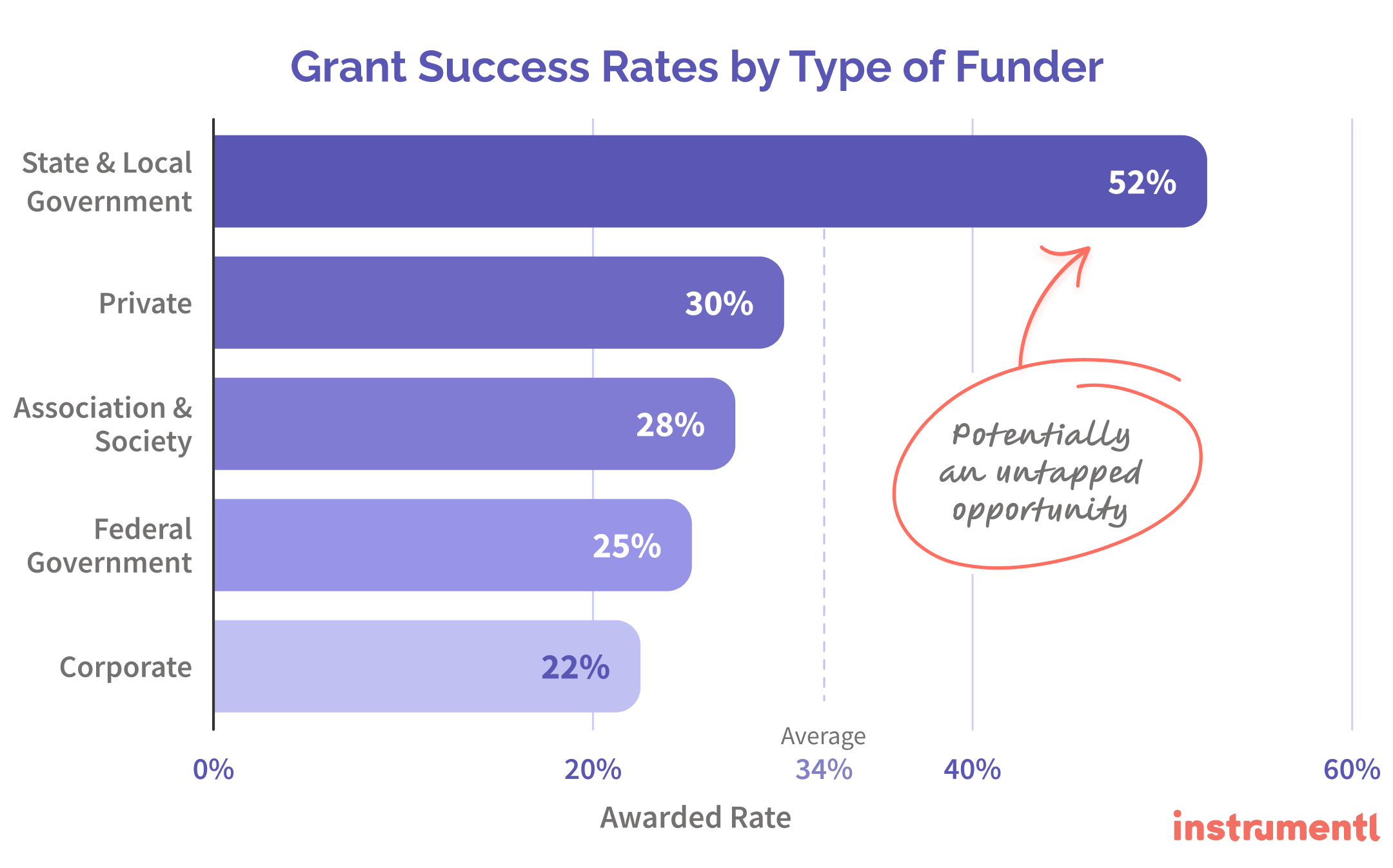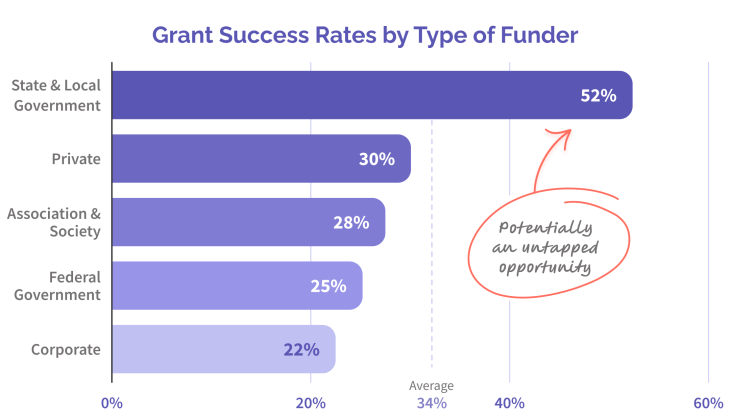Main Points
- Minority business grants play a vital role in breaking down financial barriers and encouraging entrepreneurship among marginalized communities.
- Different sources, such as government bodies, private entities, and local communities, offer these grants.
- The success rates of these grants differ greatly among various minority groups and industries, emphasizing the need for customized support.
- Networking and community backing are key to enhancing the success rates of minority business grants.
- Having a thorough business plan and a persuasive grant proposal is crucial to increase the odds of securing funding.
Welcome to the fascinating world of minority business grants. These grants can be a game-changer for entrepreneurs from marginalized communities, providing the financial support needed to make dreams come true. But what is the success rate of these grants? How do they function? And most importantly, how can minority entrepreneurs increase their chances of success? Let’s delve deeper into these questions.
Understanding Minority Business Grant Success Rates
Minority business grants are financial awards that are set up specifically to assist minority entrepreneurs in starting or expanding their businesses. These grants are not loans, so recipients are not required to pay back the funds. This makes them a popular choice for many business owners who have difficulties accessing traditional financing.

Minority business grants are available from a variety of sources, including federal and state governments, private foundations, and nonprofit organizations. Each of these sources has its own eligibility requirements, application procedures, and success rates. As a result, it’s critical for minority entrepreneurs seeking funding to understand the grant landscape.
Why Minority Business Grants Matter
Minority business grants play a crucial role for a number of reasons. Primarily, they help to even the odds by giving financial support to demographics that have traditionally been hindered from getting capital. These groups include African Americans, Hispanics, Native Americans, and other communities that are underrepresented. Through these grants, organizations are able to encourage economic development and promote diversity in the world of business.
On top of that, these grants usually provide extra assistance, including mentorship programs, networking opportunities, and business development resources. This comprehensive approach not only helps with financial stability but also provides minority entrepreneurs with the resources they need to succeed in a competitive market.
The State of Minority Business Grants Today
There’s been a recent uptick in the recognition of the value that minority-owned businesses bring to the table. This has led to a surge in the number and diversity of grants that are accessible to minority business owners. There are plenty of opportunities to be had, from government initiatives such as the Small Business Administration’s (SBA) programs to private grants from corporations like Google and FedEx.
Still, the application process can be intimidating. Every grant has its own set of stipulations, and the competition can be brutal. To successfully traverse this terrain, minority business owners need to be well-equipped and active in their approach.
Understanding Grant Success Rates
It’s important to comprehend the success rates of minority business grants to set achievable goals and devise a successful plan. Success rates can differ greatly based on several elements, such as the specific minority group, business sector, and geographic location.
Success Rates Among Different Minority Groups
There are different levels of success when it comes to different minority groups applying for business grants. For example, African American entrepreneurs often have more challenges in securing funding than their Hispanic or Asian counterparts. This disparity is due to a variety of factors, including systemic biases and differences in access to resources.
Thus, minority business owners must recognize the distinct hurdles their community encounters and pursue grants designed for their requirements. By taking this approach, they boost their likelihood of success and obtain the necessary capital to expand their businesses.
How Network and Community Support Affect Success
Network and community support are among the most important factors that contribute to the success of minority business grants. Entrepreneurs can access a wealth of resources, guidance, and opportunities through a strong network. Networking with other entrepreneurs in their community allows minority entrepreneurs to share their experiences, give and receive advice, and collaborate on projects.
Local support is usually vital in the initial stages of business growth. Local groups, chambers of commerce, and community organizations can provide workshops and mentorship programs to help minority business owners develop important skills. These programs can be particularly helpful in navigating the complexities of grant applications and understanding the specific needs of the community.
Furthermore, a robust support system can increase confidence and drive, which are essential for overcoming obstacles. Entrepreneurs who feel their community has their back are more likely to keep going in the face of adversity and achieve long-term success.
The Role of Business Planning and Management
Securing minority business grants also heavily depends on the quality of business planning and management. A comprehensive business plan shows grant providers that the business owner has a clear vision and a realistic strategy to achieve their goals. This plan should detail the business’s mission, target market, competitive advantage, and financial projections.
Having good management skills is key to showing you can be successful. Those who give out grants want to see that you, the business owner, have the right skills and experience to run the business well. You need to have a good team, manage your money wisely, and be able to change with the market. Understanding the impact of customer service on small business success can also be crucial in achieving your business goals.
How to Increase Your Chances of Winning a Minority Business Grant
To increase your odds of winning a minority business grant, you need to be strategic, proactive, and diligent. Here are some tips to help boost your chances of success:

First, you need to do your homework to find the right grant. Not all grants are the same and finding the one that fits can make a big difference. Business owners should look for grants that match their business goals and are specifically for their minority group or industry. This targeted approach can help cut down the choices and increase the chance of winning. For additional resources, consider exploring the ERTC Express consultations for global non-profits to gain insights into strategic financial support.
Finding the Right Grant
Entrepreneurs should start their grant search by doing some research. There are many databases and websites that list grants that are available. The Small Business Administration (SBA) and Grants.gov are two great places to start for finding federal grants. Local government websites and community organizations often have information on grants that are available in your area.
In addition to online resources, workshops and networking events can also be a great way to learn about grant opportunities. These events allow business owners to meet with grant providers and get a better understanding of the application process.
Creating a Strong Grant Proposal
After finding the perfect grant, the next move is to create a strong grant proposal. A good proposal will clearly state the business’s mission, objectives, and how the grant money will be used. It’s crucial to show the potential effect of the grant on the business and the community it serves.
Business owners need to tell a clear and concise story that shows what makes their business special. Adding facts and proof to back up what they say can make their proposal stronger and more convincing to the people who give out grants.
Taking Advantage of Mentors and Professional Counsel
When applying for grants, the assistance and advice from a mentor or professional can be priceless. Mentors who have experience can provide tips on creating a successful proposal, comprehending the requirements of the grant, and steering clear of frequent mistakes. They can also offer a deeper understanding of the industry and aid business owners in perfecting their business plans.
In addition to mentorship, it can be helpful to seek professional advice from business consultants or grant writers. These professionals have the expertise to review proposals, suggest improvements, and ensure that applications meet all necessary criteria.
True Success Stories
True success stories can be a source of motivation and offer valuable teachings for minority entrepreneurs who are looking for grants. These stories underline the difficulties encountered, the tactics employed, and the ultimate victories of those who have successfully obtained funding.
Take, for instance, Maria, a Latina businesswoman who launched a small bakery in her local area. Thanks to local grants and community backing, Maria managed to grow her business, employ more staff, and contribute to her community. Her success story illustrates the strength of determination and the significance of using accessible resources.
Successful Minority-Owned Businesses: A Closer Look
Examining successful minority-owned businesses can offer a wealth of knowledge about what strategies are effective and which ones aren’t. These case studies often reveal groundbreaking business models, successful marketing tactics, and the influence of community engagement.
Take for example, an article about a thriving tech startup run by African Americans. It might discuss how the founders overcame the hurdles of getting venture capital and used grant money to grow their business. This kind of narrative can provide useful tips and motivation for other minority business owners.
What You Can Learn from Successful Grant Recipients
Those who have successfully received grants often have important lessons to share. These lessons can include advice on how to create a successful proposal, how to manage grant funds effectively, and how to build strong relationships with those who provide grants. For more information on funding options, you might explore California business grants.
The key takeaway is that persistence is vital. A lot of grant recipients who eventually succeeded had to face several rejections before they finally got their funding. Their experiences highlight the importance of not giving up and continually improving proposals based on the feedback received.
Final Thoughts and What’s Next
Summing up, minority business grants are crucial in boosting underrepresented entrepreneurs and promoting diversity in the business landscape. By recognizing the elements that impact grant success rates and applying successful tactics, minority entrepreneurs can boost their likelihood of obtaining funding and realizing their business objectives.
As we look ahead, the minority business grant environment is expected to keep changing. As more people become aware and additional resources are made available, minority business owners will have more chances to get the funding they need to thrive.
Main Takeaways
Minority business grants play a vital role in supporting underrepresented business owners by providing them with financial aid that doesn’t need to be paid back. The effectiveness of these grants can greatly differ based on elements such as the minority group, the industry, and the location. African American business owners often encounter more obstacles than other minority groups, which underscores the importance of focused assistance. Having a solid network and community backing greatly increases the chances of obtaining a grant. Writing a persuasive grant proposal and showing efficient business planning are key to securing these grants.
Getting Ready for What’s Next
For minority business owners looking to secure grants in the future, it’s important to never stop learning and to make connections with others. It’s crucial to keep up to date with new grant opportunities and changes in the grant world. It’s also beneficial to spend time building relationships with potential mentors and industry experts who can offer advice and support.
- Stay informed about the latest grant opportunities by using online resources and getting involved with local organizations.
- Attend workshops and networking events to broaden your professional network.
- Seek guidance and professional advice to improve your business strategy and grant proposals.
- Create a comprehensive business plan that clearly states your mission, goals, and financial projections.
- Use community support and establish strong relationships with local organizations and chambers of commerce.
By taking these steps, minority entrepreneurs can put themselves in a position to succeed and increase their chances of getting the funding they need to expand their businesses.
Questions Often Asked
Minority business grants can be a tough nut to crack. Here are a few questions and answers to help you get a better grip on it:
What is a minority business grant?
A minority business grant is a financial gift given to business owners from underrepresented groups to assist them in starting or expanding their businesses. These grants, unlike loans, do not need to be repaid, making them a valuable resource for minority entrepreneurs.
Where can I find minority business grant opportunities?
For minority business grant opportunities, begin by looking at online databases such as Grants.gov and the Small Business Administration’s website. Information on regional grants can also be found on local government websites and community organizations. Moreover, workshops and networking events can be beneficial in finding new opportunities and making connections with grant providers.
Joining minority business associations or chambers of commerce is another effective strategy. These organizations often provide resources and information on available grants. They also provide valuable networking opportunities and support, helping small businesses succeed. For more insights, read about customer service’s role in small business success.
What are the key elements to successfully securing a grant?
There are many elements that can increase your chances of successfully securing a minority business grant. These include a well-crafted grant proposal, ensuring your business goals align with the goals of the grant, and being able to show you have a solid business plan and can manage your business effectively. Having strong community support and a solid professional network can also increase your chances of success.
Do minority businesses have higher success rates in certain sectors?
Minority businesses’ success rates can differ from one sector to another. Some sectors, like technology and healthcare, might present more growth and funding opportunities. However, success usually hinges on the entrepreneur’s knack for pinpointing and leveraging market trends and opportunities in their particular industry.
Minority entrepreneurs need to do in-depth market research and comprehend the distinctive difficulties and opportunities in their chosen industry. This comprehension can assist them in customizing their business plans and enhancing their probability of success. For example, understanding where minority entrepreneurs are succeeding can provide valuable insights into crafting effective strategies.
Is a business plan necessary for a grant application?
Having a well-thought-out business plan is key to securing a grant. It shows those providing the grant that you have a clear direction and strategy to reach your business objectives. A good business plan includes information on your mission, target audience, competitive edge, and financial forecasts.
Does community support affect the likelihood of obtaining a grant?
Indeed, community support can have a substantial impact on the probability of receiving a grant. A robust support network can offer useful resources, advice, and opportunities that might not be accessible otherwise. Community participation can also boost your business’s credibility and show grant providers that you have a strong basis for success.
Developing connections with local groups, chambers of commerce, and community organizations can give you the chance to participate in mentorship programs, workshops, and networking events, all of which can increase your odds of obtaining funding. For small companies, using the best CRM software can further enhance these networking efforts and improve your business operations.
Where can I find more information on minority business grants?
If you’re looking for more information on minority business grants, try looking at online databases such as Grants.gov and the Small Business Administration’s website. You can also check out local government websites and community organizations, as they often have information on grants in your area.
Being a part of minority business groups or commerce chambers can be beneficial. They offer resources and a chance to network with others. They can provide support, advice, and information about grants that are available. This will help you apply for grants more successfully.

